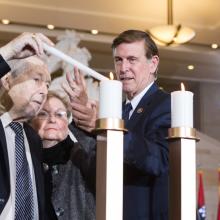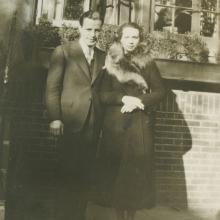Holocaust Remembrance Day
“Being here made me realize how important my Judaism is. I’m a link in a long chain that the Holocaust tried to break. People my age are the future.”
April 12 marks Holocaust Remembrance Day. Each year communities and schools plan various events such as reading the names of Holocaust victims and survivors, forums of Holocaust survivor speakers, or panel discussions with historians. These events run through an entire week of remembrance.
President Trump will deliver an “inspiring yet direct” speech on the need to confront radical ideologies during his upcoming trip to Saudi Arabia.
The speech will come during an afternoon lunch with leaders of more than 50 countries with mostly Muslim populations, White House national security adviser H.R. McMaster announced on May 16.
Anti-Semitic incidents, from bomb threats and cemetery desecration to assaults and bullying, have surged in the United States since the election of President Donald Trump, and a "heightened political atmosphere" played a role in the rise, the Anti-Defamation League said on April 24.
The condemnation came too little, too late, Jewish groups said.
On Feb. 21, President Trump condemned anti-Semitism, as Jewish leaders had been asking him to do for months.
“The President’s sudden acknowledgement is a Band-Aid on the cancer of Anti-Semitism that has infected his own Administration,” said Steven Goldstein, executive director of the Anne Frank Center for Mutual Respect, in a statement on Feb. 21 after Trump called anti-Semitism “horrible.”

Image via United States Holocaust Memorial Museum / RNS
At Holocaust Remembrance Day at the Capitol, speakers warned of anti-Semitism as a problem of the millennia, and hate speech as a challenge that threatens present-day America.
Eight elderly survivors of the Holocaust — which took the lives of 6 million Jews, including 1.5 million Jewish children — lit six candles at the Capitol’s Emancipation Hall on May 5 as a United States Holocaust Memorial Museum official told of the death camps they survived, and of those who had risked their lives to save them.
Gilbert and Eleanor Kraus lived a comfortable life in 1930s Philadelphia, where he made a good living as a lawyer, and she kept a stylish house.
They were secular Jews who sent their children to a Quaker school, and unlikely candidates for the mission they assigned themselves. Gilbert revealed the plan to his wife as he was shaving in the bathroom, so their young son and daughter would not hear.
He wanted to go to Vienna and save 50 Jewish children from the Nazis.





